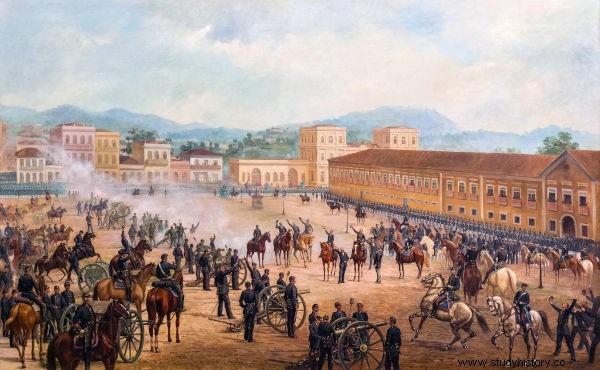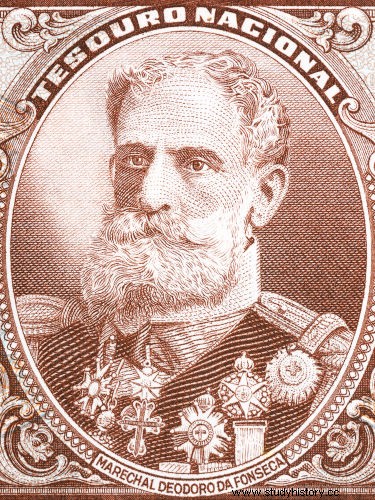The proclamation of the republic took place on November 15, 1889 and resulted in the overthrow of the monarchy and the establishment of the republic in Brazil. This event was the result of a long weakening that the monarchy faced in Brazil from the 1870s onwards. One of the most dissatisfied groups was the military.
The conspiracy against the monarchy had the accession of Marshal Deodoro da Fonseca, responsible for leading the overthrow of the ministerial cabinet. During the 15th, political movements made José do Patrocínio proclaim the republic in the City Council of Rio de Janeiro.
Login also :Could slavery have been abolished before 1888?
Monarchy Crisis

The proclamation of the republic was the result of the crisis of the empire and its inability to meet the new demands that emerged in Brazilian society. These dissatisfactions converged on the republican movement, which, partly on the basis of planning and partly on the basis of improvisation, carried out a coup that ended the monarchy in Brazil.
We can consider that this crisis of the monarchy in Brazil started in the decade of 1870, right after the Paraguay War . Brazil won the war, but the monarchy was weakened and the new political rearrangements that were taking shape in Brazil since the 1860s began to gain ground in the political debate.
The two main disaffected groups that directly influenced the end of the monarchy were certain groups politics , who demanded the modernization of the country and new agendas for Brazilian politics, and the military . Both orbited around republicanism, a form of government that came to be seen as modern and as a solution for the country.
-
Military dissatisfaction
In the case of the military, dissatisfaction with the monarchy began after the war, precisely when the Brazilian Army established itself as a professional institution. This made the military begin to organize themselves in defense of their rights. His two main demands became increase salary and improvement in the career system .
The military also demanded for themselves the right to express their political opinions , since they began to see themselves as responsible for the protection of the State. In addition, there was dissatisfaction among them due to the fact that Brazil is not a secular country, and all these issues made them embrace positivism, a set of ideas defended by French sociologist Augusto Comte.
positivism has become the official discourse for the questioning of the monarchy by the military. In the end, most of them started to defend that the modernization of the country should be carried out on the basis of a republic dictatorial , in which a ruler would represent the interests of the people. To make matters worse, the dissatisfaction of the military was still encouraged by other groups in society.
-
Political dissatisfaction
In politics, there was great dissatisfaction with the monarchy, especially in provinces like São Paulo, due to the political underrepresentation . Economically, São Paulo was already the main state in Brazil, but politically its representation was very small compared to other states with declining economies, such as Bahia, Pernambuco and Rio de Janeiro itself. This mobilized the political elites of the province to demand greater participation.
Sociologist Ângela Alonso also talks about dissatisfaction in emerging groups in cities who wanted to have a political voice , but they couldn't because the monarchy's political system was openly exclusionary|1| . Liberals even tried to include part of society in the electorate, but the reality that imposed itself was the opposite:the Saraiva Law , 1881, drastically reduced the electorate Brazilian.
The problems of the monarchy, therefore, created a group of dissatisfied who came to see the republic as an alternative for the development of Brazil. Extremely important starting points for the strengthening of republicanism here were the foundation of the Partido Republicano Paulista (PRP) and the launch of the Republican Manifesto, in 1870.
The PRP emerged through the Radical Club, and was formed by a group of republicans from São Paulo who were dissatisfied with the politics of the monarchy, mainly because of the centralization of power and the lack of autonomy of the provinces. However, the PRP, which emerged in 1873, was only possible thanks to the Republican Manifesto, published three years earlier.
This manifesto became a beacon for the defenders of the republic in Brazil and defended the idea that the great evils of the country came from the monarchy. The manifesto also criticized centralism and proposed federalism as the main action for the benefit of the country. The federalist question, in the defense of autonomy for the provinces, was one of the great mottos of the defenders of the republic in Brazil.
-
Other demands
Other great demands of the time were the establishment of secularism in Brazil, that is, the transformation of Brazil into a secular state, and the issue of abolitionism , one of the agendas that moved Brazilian society in the 1880s. The vast majority of abolitionists were supporters of republican ideals, and the mobilization in defense of the movement was inclined towards the implantation of the republic.
Finally, there was dissatisfaction over the succession to the throne . Princess Isabel was not considered the ideal person to assume the throne and the possibility that her husband, a Frenchman, would become emperor was not very well accepted either. She even considered having her eldest son crowned, but that idea did not advance.
Login also :Government Floriano Peixoto - the second president of Brazil
Conspiracy
We realized, therefore, that there were numerous reasons for dissatisfaction against the monarchy, and, in the words of Ângela Alonso, “the overlapping political crises, added to social mobilization, produced the favorable conjuncture for regime change”|2| . She adds that, in 1889, the question was not whether the monarchy would fall, but when it would fall.|2| .
Associations and groups defending republicanism began to take actions on the street in defense of the establishment of the republic, and newspapers of the time propagated these ideals . In July 1889, the monarchy banned these demonstrations, but it was too late. Conspiracies against the monarchy took place, in civilian and military circles.
Names like Benjamin Constant , Quintino Bocaiuva , Antonio da Silva Jardim , Joseph from Sponsorship , among others, moved for the implantation of the republic in Brazil. The army was also increasingly agitated by the possibility of acting against the monarchy. In November 1889, rumors of a military uprising were strong in Rio de Janeiro.
-
Proclamation of the Republic

The proclamation of the republic was the result of a coup headed by the military, but with civilian involvement, and it was partly planned, and partly improvised. In early November, as we have seen, rumors of a conspiracy were very strong. The decisive step for the proclamation to be launched was the accession of Marshal Deodoro da Fonseca .
On November 10, Republicans went to the marshal's house to convince him to join them in a movement to overthrow the Viscount of Ouro Preto from the Cabinet. Among those present were Rui Barbosa, Benjamin Constant and Aristides Lobo. The marshal was convinced to join the coup after a series of arguments based on many rumours.
The marshal's accession took place with the following objective:the dismissal of the Viscount of Ouro Preto . The events of the proclamation of the republic were divided, by the historian Ângela Alonso, into eight episodes, which lasted for 81 hours, starting on November 14, 1889. The episodes narrated by her were the following|3| :
- Unleashing Civil-Military Uprising
- Deposition of Ministerial Cabinet
- Monarchist reaction
- Mobilization in public space and proclamation of the republic
- Republican Government Formation
- Attempt to form a royalist cabinet
- Siege of the imperial family and takeover of the provisional government
- Dynasty Deportation
Within this composition, the coup that led to the proclamation of the republic was carried out on November 15, 1889 . However, actions related to this event began on the 14th through fake news broadcast with the aim of generating adherence to the ongoing coup. This put some military groups into action against the monarchy.
The next day, the 15th, troops led by Deodoro da Fonseca surrounded the headquarters in Campo do Santana. He ordered that the Viscount of Ouro Preto and the Minister of Justice, Cândido de Oliveira, be arrested. After arresting the two, the marshal praised the emperor and went to his house, waiting for d. Pedro II to form a new cabinet.
However, that didn't happen. Meanwhile, other people involved in the conspiracy began to act to make this event responsible for the proclamation of the republic. During the afternoon of the 15th, it was proposed that the republic be proclaimed in the City Council or the Senate.
It was decided that the proclamation would take place in a session of the City Council, and in it, José do Patrocínio was responsible for the proclamation of the republic in Brazil. There was some celebration in the streets of Rio de Janeiro, with parades and cheers being led by those involved in the conspiracy. In these celebrations, there is talk of popular participation.
There was a resistance attempt organized by monarchists, such as Conde d’Eu and André Rebouças, but it did not advance. The Emperor D. Pedro II, who was in Petrópolis, still tried to form a new cabinet, but his proposal was not accepted. The Republicans then formed a provisional government.
The interim government counted with many of those involved in the conspiracy against the monarchy. Quintino Bocaiuva assumed the Foreign Affairs portfolio; Benjamin Constant took over the War portfolio; Aristides Lobo took over the Interior portfolio; Rui Barbosa took over the Finance portfolio, etc. Marshal Deodoro da Fonseca, in turn, was nominated for the presidency.
Finally, the imperial family was expelled from Brazil. On November 16, she was ordered to leave the country within 24 hours, and on the same day, a decree from the provisional government announced that she would receive the sum of five thousand réis. However, this indemnity measure was revoked in December 1889. On November 17, the royal family set sail for Lisbon.
Login also :Constitution of 1891 – the first Constitution of Brazil
Consequences
The proclamation of the republic was a landmark event in the history of our country and brought significant changes. Among them, we can mention:
- Republic Implementation
- Implementation of Federalism
- Establishment of universal male suffrage and end of census vote
- Implementation of the Secular State
- Establishing presidentialism
The 1890s were marked as a decade of conflicts, fruits of the dispute between monarchists and republicans and of disputes between the different political interests that fought for power in the newly installed republic.
Notes
|1| ALONSO, Angela. Establishment of the republic in Brazil. In.:SCHWARCZ, Lília M. and STARLING, Heloísa M (orgs.). Dictionary of the Republic :51 critical texts. São Paulo:Companhia das Letras, 2019. p. 164.
|2| Ditto, p. 166.
|3| Ditto, p. 167-171.
Image credit
[1] Commons
